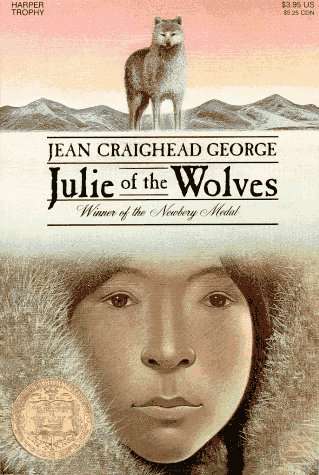Julie of the Wolves

Julie of the BIG GIANT HEAD.
A young girl named Miyax attempts to escape from her former home and winds up lost on the Arctic tundra. She runs into a pack of wolves and rather than devouring her, she is adopted by them. The book deals with her struggle to learn how to communicate with wolves and her reasons for leaving.
The first novel, Julie Of The Wolves was written by Jean Craighead George in 1972, and two sequels, Julie and Julie's Wolf Pack, followed. The first installment is often studied in classrooms and is also one of the most frequently banned books in classrooms due to its portrayal of death, rape, violence and menstruation.
Tropes used in Julie of the Wolves include:
- Animal Talk: A more realistic version. Wolves, don't communicate in words, but rather how we'd expect them to, with body language, touch and smells. Miyax spends a good third of the novel learning how to speak this new "language" and it's implied that other animals have their own set of signals like a flicking tail motion that shows that a ground squirrel is friendly.
- Arranged Marriage: At thirteen, Miyax marries the son of her father's business partner to escape living with her well-meaning but no-nonsense aunt. The match had been set up for Julie at a young age, but the ultimate decision was up to her. Another character explains that marriages like Julie's are quite common in their town and until both spouses get a bit older they mostly live like brothers and sisters.
- Attempted Rape
- Big Badass Wolf: The story is chock full of them, but most notably, Amaroq, the alpha male.
- Bittersweet Ending: Sure at the end Julie makes it out of the tundra and is united with a long-lost member of her family, but her surrogate parent is dead, her pet is dead and the Eskimo way of life is over.
- Death by Newbery Medal: Alas, poor Amaroq.
- Deliberate Values Dissonance: Certain foods and smells are described as being delicious or wonderful, but given that these items tend to be things like raw owl entrails and wolf piss, it's more Squick than anything. The former is an actual Eskimo delicacy, and the latter is due to Miyax's experience with wolves.
- Disappeared Dad: Miyax's father disappears while kayaking and is presumed to be dead. He's not.
- Floating Head Syndrome: Most editions of the book are victim to this.
- Head Pet: Tornait the Arctic tern.
- Nausea Fuel: Invoked several times by the Deliberate Values Dissonance, but the scene that stands out is the one where Miyax eats caribou meat regurgitated by a wolf and enjoys it.
- Noble Savage: Played with. At first Julie is convinced of this herself, but it's shown that some of the old ways can be counterproductive, Harmful to Minors, or even plain cruel by modern standards.
- No Periods, Period: Implied to be a trope present in Eskimo culture. Miyax hasn't had her first period yet, but an Eskimo couple she encounters on the tundra guesses that her period is the reason she's out there alone. The woman recalls an old and mostly-defunct tradition to send young women into the wilderness by themselves when they are menstruating.
- Parental Abandonment
- Raised by Wolves
- Rape as Drama
- This Is My Name on Foreign: Julie's birth name is actually Miyax.
- Xenofiction: Not so much the first two installments, but the last book, Julie's Wolf Pack, certainly qualifies
This article is issued from Allthetropes. The text is licensed under Creative Commons - Attribution - Sharealike. Additional terms may apply for the media files.